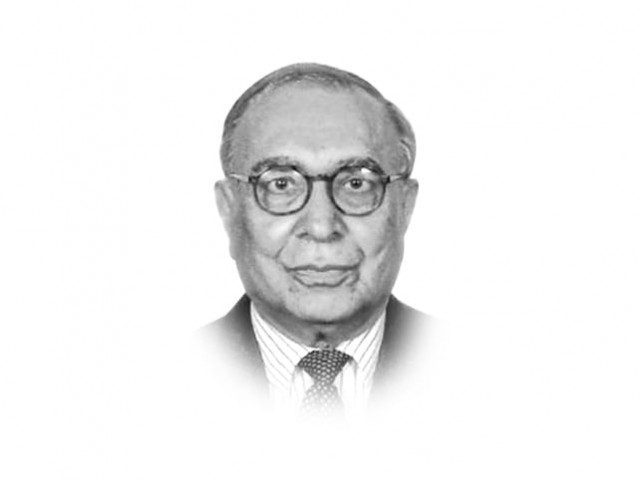General Kayani in Kakul
General Kayani has rightly said that nothing is more difficult for the army than to battle our own people.

The subsequent prolongation of the conflict and its spillover into Pakistan with Pakistani territory lost to anti-state militants created a situation of total dependence on the armed forces. Sacrifices made by the army in reclaiming the lost territory — a work still in progress — have eclipsed anything that the political class might have done. Add to this, the fact that the PPP-led coalition has, since 2008, remained disproportionately preoccupied with sheer survival, defence of what was harvested through the ill-fated National Reconciliation Ordinance and, on the positive side, with tidying up the constitutional mess left behind by General Pervez Musharraf. You know now why the civilian grip on foreign and national security issues continues to be so tenuous. Despite Pakistan’s sad experience of military rule in the past, a surprisingly large percentage of its people are once again beginning to look to the army for deliverance from an elected government that has disappointed them deeply.
It was against this backdrop that General Ashfaq Parvez Kayani delivered his address to the Kakul Independence Day parade. He touched upon several key issues and spoke to audiences across the country. As before, he conveyed the concern of the armed forces about the dire situation in the country — the perilous state of economy, misgovernance, corruption, rapid deterioration of civic amenities — without actually raising the spectre of military intervention or even hinting at a roadmap, that the military would support to salvage the state. This restraint and continued respect for constitutionalism augur well for Pakistan’s troubled democracy.
General Kayani spent quite some time on defining extremism and terrorism and on distinguishing between them. In an atmosphere of pervasive distrust, there has been some talk that the army’s resolve to be guided solely by national interest while assisting US-Nato operations has weakened and that the Kakul address was designed to prepare the armed forces and the people for a new military campaign in North Waziristan. Statements by US Defence Secretary Leon Panetta and commentaries in the American media have reinforced this impression. The issue needs further consideration.
If the benchmark is Mohammad Ali Jinnah’s vision of a state based on equity, tolerance and social justice, General Kayani was right in maintaining that the nation has yet to realise the agenda of 1947. The analysis would, however, have been more complete if he had used this occasion to align the armed forces strongly with the view that the roots of extremism that have morphed into terrorism on such a large scale in Pakistan, are also to be found in the staggering deficit in investment in education, health, research and social welfare over many long decades. This deficit has created a huge pool of socially-challenged citizens who can be exploited by men of violence in our midst.
Since several critics in Pakistan routinely blame this neglect of comprehensive national development on the armed forces, it is appropriate that military leaders weigh heavily on the side of radically strengthening these sectors of non-traditional security for all people and not just the privileged elite living in gated communities. Terrorism in Pakistan has not come solely from the much-maligned mullah; more than one political party in Pakistan inculcated intolerance and violence in poorly educated and disadvantaged masses to advance parochial agendas; these political interests showcase their success regularly in Karachi. Backwardness of society was also a boon for Pakistan’s military dictators.
General Kayani has rightly said that nothing is more difficult for the army than to battle our own people. All the precepts of the doctrine of ‘Just War’ (jus ad bellum) and how it is conducted (jus in bello) assume added dimensions when the state resorts to the use of force within its own territory. Admittedly, the extraordinary criminalisation of anti-state movements like the Tehreek-e-Taliban Pakistan entitles the state to deploy counter-force. But military campaigns put an extra premium on justification, as well as on the principle of proportionality that every state functionary should be fully familiar with. General Kayani did well to remind the people that they must support the armed forces in their mission against terrorism. The people, in turn, expect that military operations in Pakistan are acts of last resort and that they conform to the time-honoured principles of just wars and also the letter and spirit of Pakistan’s own Constitution.
Unfortunately, foreign powers have been able to create a vocal lobby in Pakistan that is largely indifferent to Pakistani losses and that still gives priority to what by now is a fast unravelling regional project of the so-called international community. Repeated Gallup polls show that what the people demand is different. For them, the martyrdom of every single soldier must be audited as, indeed, the death of every innocent citizen caught up in a conflict that is not understood even after a horrendous decade.
Pakistan’s chequered history has produced a binary approach to civil authority and the armed forces. The fact of the matter is that these two centres of power have to be in total harmony to overcome the internal challenge of extremism and terrorism as well the threats from outside. It is fashionable to say that there are no external threats any more. Regrettably there are threats from enemies as well as from short-sighted ‘friends’ who want to convert Pakistan into a pliant, weakened and denuclearised mercenary state available for their regional projects. In this unfavourable context, anything that produces a disconnect between the people and the armed forces can only add to the current fragility of the state.
Published in The Express Tribune, August 18th, 2012.















COMMENTS
Comments are moderated and generally will be posted if they are on-topic and not abusive.
For more information, please see our Comments FAQ